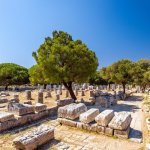I'm currently planning a trip to Greece and am passionate about making my travel as sustainable and eco-friendly as possible. Given the beauty and historical significance of Greece, I want to ensure that my visit contributes positively to the environment and local communities there.
Does anyone have any tips or experiences they could share on sustainable travel practices in Greece? I'm looking for advice on everything from eco-friendly accommodations, sustainable dining options, to ways of exploring the country that minimize my carbon footprint. Also, if there are specific activities or tours that support local conservation efforts or communities, I'd love to hear about those too!
Using a donkey for travel in Greece could potentially minimize the carbon footprint compared to using motorized vehicles, depending on various factors.
1. **Emissions**: Donkeys do not emit greenhouse gases like cars or other motorized vehicles. Thus, using a donkey would be more environmentally friendly in terms of direct emissions.
2. **Fuel Consumption**: Donkeys do not require fuel like cars or other motorized vehicles. This means they do not consume fossil fuels, which are major contributors to carbon emissions.
3. **Feed**: Donkeys primarily consume vegetation like grass and hay. If these food sources are locally sourced and sustainably produced, the carbon footprint associated with their feed could be lower than fossil fuel production and transportation for motorized vehicles.
4. **Terrain and Distance**: Donkeys are well-suited for certain terrains, such as mountainous or rugged areas, where motorized vehicles might not be as efficient or practical. If the journey is short and the terrain is suitable, using a donkey could indeed be a sustainable mode of travel.
However, there are also factors to consider:
1. **Animal Welfare**: Using animals for transportation raises ethical concerns regarding their welfare. Ensuring that the donkeys are well cared for, not overburdened, and provided with proper rest and nourishment is essential.
2. **Travel Time**: Traveling with a donkey might take longer than using motorized vehicles, especially for long distances. This could impact the practicality of using a donkey for specific journeys.
3. **Infrastructure**: The availability of suitable infrastructure for donkey travel, such as trails or paths, could also affect the feasibility of using them as a mode of transportation.
In summary, while using a donkey for travel in Greece could potentially minimize the carbon footprint compared to motorized vehicles, it's essential to consider factors such as animal welfare, travel time, and infrastructure before determining its practicality and sustainability for specific journeys.



